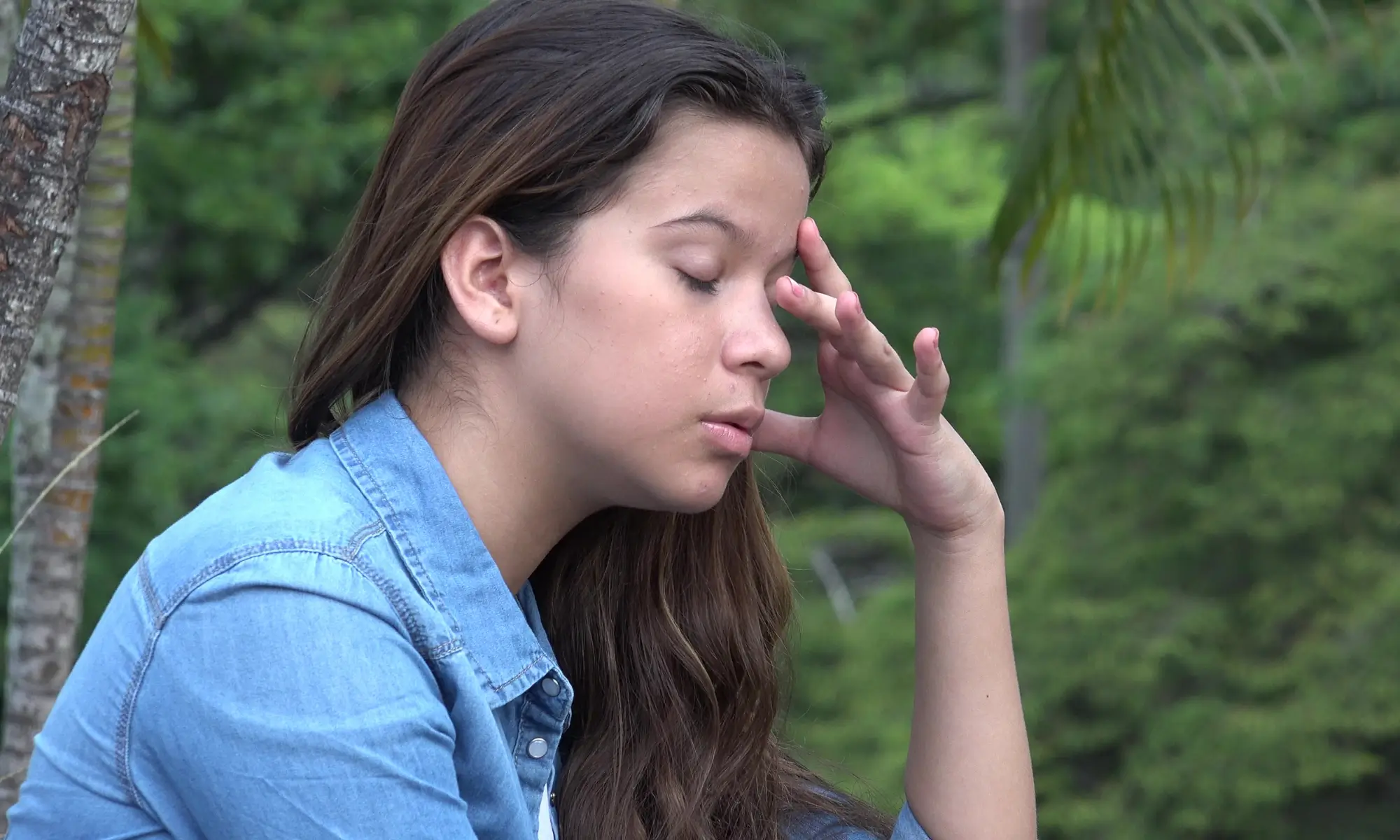Table of Contents

How to Identify a Teen With Anxiety?
The Finding out that your teen is feeling constantly anxious can be an anxiety-provoking thing for parents and guardians. And probably the first thing we think is When will it stop? Anxiety is a normal emotion we have in response to stress that protects and alerts us to things of importance. It can even help us perform necessary tasks in our daily lives.
However, teen anxiety that is out of proportion to a situation, with sustained distress, worry or fear in response to an emotional trigger, or affects our ability to function, could indicate an anxiety disorder.
Anxiety disorder is according to the latest data, the most common mental health problem in the US, affecting 8-10% of the population. About 8% of children and teenagers struggle with anxiety
Anxiety in Teens tends to be a serious issue that tends to be overlooked because it is monstly caused by:
1) Their desire to do well,
2) The thought of how they are being perceived
3) Their body image.
It can be hard to notice anxiety because teens are good at hiding their feelings. Symptoms also vary from kid to kid.
Symptoms of Anxiety in Teens
Common emotional symptoms of anxiety that teens experience are:
- Being sensitive to criticism or extremely self-conscious
- Always worrying about things that aren’t likely to happen
- Feeling irritable/nervous
- Feeling restless
- Avoiding difficult or new situations that make them anxious
- Being withdrawn
- Having trouble concentrating and starting or finishing schoolwork
- Wound-up/On edge
- Being easily fatigued
- Difficulty concentrating and/or mind going blank
Physical symptoms Include:
- A racing heart
- Feeling dizzy
- Sweating
- Shaking
- Shortness of breath
- Feeling ‘butterflies’ in their stomach
- Headaches
- Other aches (especially in their neck, shoulders and back)
- Sleep problems
- Muscle tension
- Stomachaches
Anxious teens may start to use marijuana or alcohol to feel less anxious. While this may work in the short term, their anxiety doesn’t actually go away. Eventually, teens can become dependent on the substance.
Secondary Anxiety Symptoms
Here are some common coping mechanisms seen in teens with anxiety:
- Compulsive nail-biting
- Messing with hair
- Tapping Hands or Feet
- Head Nodding
- Frustrated and Hesitated Breathing
- Lip biting
Anxiety and Anxiety Attacks
Feeling anxious and having anxiety disorder are not the same. Anxiety is an emotion characterized by tension, worried thoughts, and physical characteristics, such as increased blood pressure and sweating.
One common type of anxiety teens experience is test anxiety. It’s a type of performance anxiety, where there is a lot of pressure to do well. For example before a basketball game, dance performance or trying out for the school play, and of course for exams, especially finals.
To cope with test anxiety, there are a number of strategies teen can use: staying on track with study strategies without distraction, visualizing success, getting good sleep, and adopting good coping strategies—such as calming breathing and progressive muscle relaxation and positive thinking around their goals.
Panic disorder is a more aggressive and intense form of anxiety that seems to come out of nowhere and causes severe episodes known as “anxiety or panic attacks”, which cause some or all of the following symptoms:
- Dizziness
- Hyperventilation (rapid breathing)
- Palpitations (rapid heart rate)
- Nausea
- Sweating
- Shaking
- Crying
Teens with panic disorder often fear going to places or doing things that might cause a panic attack.
How Long Does an Anxiety Attack Last?
Acute anxiety attacks usually go away once the threat or stressor passes and your system calms down. Typically this may be from 10-30 minutes depending on the severity of the trigger. A lot depends on the teen’s coping mechanisms and support of friends or family.
However, anxiety can linger beyond the triggering event and become out of proportion. An anxiety disorder involves recurring, intrusive thoughts or concerns and other specific criteria that lead to a diagnosis. The exact causes of anxiety disorders are unknown.
As reported in Healthmatch, data from the Netherlands Mental Health Survey and Incidence Study-2 indicates the median duration of an anxiety disorder is around 7.5 months. This chronic (long-term) or severe anxiety can seriously impair your daily functioning.
Some studies report that generalized anxiety disorder follows a pattern of recovery and relapse for up to 20 years. Much depends on the individual’s resilience, coping strategies, support systems and ability to follow treatment plans.
Can A Teen Ever Recover From Anxiety?
Feeling anxious is part of the normal range of adolescent emotions, like feeling angry or embarrassed. For most teenagers, anxiety doesn’t last and goes away on its own. But for some teenagers, it doesn’t go away or is so intense that it stops them from doing everyday things.
With appropriate treatment, therapy and/or medication and emotional support from parents, friends and loved ones, anxiety is manageable for teens.

Anxiety Treatment and Anxiety Attack Prevention
Preventive lifestyle things teens can do to help prevent anxiety include:
- Get regular physical activity
- Eat well
- Reduce their caffeine intake
- Avoid smoking and alcohol, which can make anxiety worse
- Get enough sleep
- Deal with any issues causing anxiety
- Reduce their stress levels through mindfulness, meditation or relaxation
- Do breathing exercises such as the 4-7-8 breathing technique:
- Breathe in for 4 seconds
- Hold your breath for 7 seconds
- Exhale for 8 seconds
- Mindfulness meditation
- Yoga, journaling
- Art therapy
- Exercise
While anxiety may not be fully eradicated, it can be managed and addressed using different approaches. Typically this involves a combination of:
Talk therapy: Common forms of include: Cognitive Behavioral Therapy (CBT), Dialectical Behavior Therapy (DBT), Acceptance and Commitment Therapy (ACT), Couples or Family Therapy.
Medications: Usually combined with talk therapy, they include: Anti-anxiety medications (Benzodiazepines), Beta-blockers, antidepressants such as Serotonin-norepinephrine reuptake inhibitors (SNRIs) and Selective serotonin reuptake inhibitors (SSRIs) and Tricyclic antidepressants.
Sources
Katzenstein J. Anxiety and Stress in Teens. Johns Hopkins All Children’s Hospital.
Miller C. How Anxiety Affects Teenagers.Child Mind Institute.
Austin Davis, LPC-S
Founder & CEO
Originally from the Saginaw, Eagle Mountain area, Austin Davis earned a Bachelor of Science in Pastoral Ministry from Lee University in Cleveland, TN and a Master of Arts in Counseling from The Church of God Theological Seminary. He then went on to become a Licensed Professional Counselor-Supervisor in the State of Texas. Austin’s professional history includes both local church ministry and clinical counseling. At a young age, he began serving youth at the local church in various capacities which led to clinical training and education. Austin gained a vast knowledge of mental health disorders while working in state and public mental health hospitals. This is where he was exposed to almost every type of diagnosis and carries this experience into the daily treatment.
Austin’s longtime passion is Clearfork Academy, a christ-centered residential facility focused on mental health and substance abuse. He finds joy and fulfillment working with “difficult” clients that challenge his heart and clinical skill set. It is his hope and desire that each resident that passes through Clearfork Academy will be one step closer to their created design. Austin’s greatest pleasures in life are being a husband to his wife, and a father to his growing children. He serves at his local church by playing guitar, speaking and helping with tech arts. Austin also enjoys being physically active, reading, woodworking, and music.





